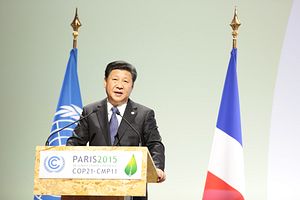Chinese President Xi Jinping arrived in Paris, France on Monday to attend the United Nations-sponsored talks on climate change (formally known as the 21st session of the Conference of the Parties to the United Nations Framework Convention on Climate Change, or COP21 for short). Xi’s presence in Paris marks the final step in China’s recent push to highlight its efforts on climate change, which dovetail nicely with Beijing’s attempts to clean up the air, water, and soil pollution (among other environmental issues) that plague the country.
Xi gave a speech during the opening ceremonies of COP21, in which he urged countries to “reject the narrow-minded mentality of a zero-sum game” in favor of win-win cooperation. That will require all countries – particularly developed countries – to take on more shared responsibilities, Xi said. As part of those responsibilities, the developed world should providing financial support and transferring climate-friendly technologies to developing countries, he explained.
Meanwhile, “addressing climate change should not deny the legitimate needs of developing countries to reduce poverty and to improve their people’s living standards,” Xi said.
Xi also spoke at some length about the need for the Paris agreement to be legally binding. It is “imperative to ensure the effective observance and implementation of international rules,” Xi said.
The COP21 talks are supposed to end up in a legally binding treaty that outlines each country’s commitments toward slowing climate change and mitigating its impact. The general mood has been optimistic, although current commitments from all the parties involved will not be enough to keep warming below the desired two degree Centigrade limit. In the past, talks have reached deadlock, with the United States and China in particular on opposing sides, generally representing the developed and developing world – and both arguing the other side should be doing more.
Yet even while China has kept much of the rhetoric of “common but differentiated responsibilities” – which insists that the developed world must shoulder the bulk of the responsibility, while developing countries can prioritize economic growth over fighting climate change — China’s own approach has undergone a sea change since the 2009 climate change talks in Copenhagen failed to reach agreement on a new treaty. As Xi pointed out, China is now the world leader in energy conservation and the use of new and renewable energy. Xi also promised that there’s more to come as China’s 13th five year plan will heavily feature an ecological focus.
Meanwhile, U.S. President Barack Obama comes to Paris determined to see a strong treaty on climate change – despite questionable political support for serious efforts back in Washington. Obama and Xi met on Monday on the sidelines of COP21, and Obama emphasized that China and the United States share “a common vision for what’s needed in a Paris agreement, including moving toward a low-carbon global economy in this century, enhancing transparency to build trust, and robust financial support to help developing countries adapt.”
The outlook is decidedly more hopeful now than it was six years ago, but success is still far from certain. The longstanding deadlock over how just how ‘differentiated’ responsibilities for tackling climate change should be continues to divide the developed and developing world. And on that front, China – which sees itself as both leader and champion of the developing world – has not changed its position.
In an interview with Xinhua, China’s chief negotiator on the Paris talks, Su Wei, echoed Xi, saying that the Paris agreement “should have legal force” and “be consistent with principles, provisions, targets and framework of United Nations Framework Convention on Climate Change (UNFCCC)” – which enshrined the idea of “common but differentiated responsibilities.”
“China will continue to address the issue with a positive and serious attitude… however, our position on insisting principles of common but differentiated responsibility will not change,” Su said.
Su added that previous progress of the negotiations on the text of the treaty “was not satisfying… a number of divergences remain to be bridged.” The goal is to have a draft text finalized by December 3, so that each country has time to review and make decisions on the draft before the December 11 deadline.
“Time is quite pressing, [so] we will make every minute and second count,” Su said.

































